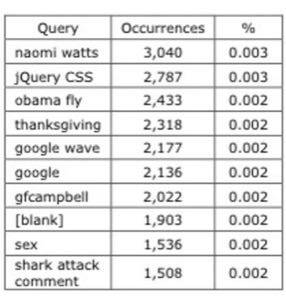Real-time search is very different from regular search. After studying about 1 million queries on real-time search engine Collecta, researchers at Pennsylvania State University came to the conclusion that – relative to regular search – users of real-time search engines tend to search less for adult topics and focus more on technology, entertainment and politics. This, according to the researchers, reflects “both the temporal nature of the queries and, perhaps, an early adopter user base.”

API Accounts for Most Queries
According to the data the research team collected, most real-time queries come from third-party applications and don’t happen on the search engine’s own page. On Collecta, API queries account for about 60% of all queries and we’ve heard similar – and often even higher – numbers from other real-time search engines. As these API-based queries are often repeated multiple times throughout the day, real-time search engines also tend to see fewer unique queries than regular search engines.
Top Queries
The researchers also collected a list of the most popular queries on Collecta during a 190-day period at the end of last year. This data shows that the typical queries on real-time search engines are quite different from what we would expect to see on a regular search engine. Even the most popular search term (“naomi watts”), only accounted for 0.003% of all queries. According to Hitwise, “facebook” is currently the most popular search term on all the major search engines (Google, Yahoo, Bing) and accounts for between 1.17% of all queries on Google to 2.6% of all queries on Bing.

Where’s the Porn?
As the researchers note, Collecta registered almost no searches that were pornographic in nature. “Sex” was the ninth most popular search term and only accounted for 0.002% of all queries.
Early Adopters
As the researchers rightly note, the list of most popular search queries on Collecta reflects the early-adopter nature of the service. The fact that the second-most popular query was “jQuery CSS” is a good example for the nature of real-time searches. To some degree, of course, these numbers are also biased towards Collecta’s users and the kind of applications that have been developed on top of Collecta’s API.
It will be interesting to see what these numbers look like by the end of this year. If “jQuery CSS” is still in the top 10 of most often used queries, we can safely assume that Collecta – and maybe real-time search as a whole – hasn’t reached a mainstream audience yet.

















